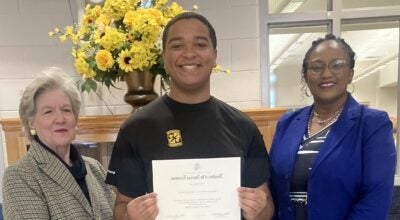Local agencies hold Breast Cancer Awareness Month meeting
Published 10:07 am Tuesday, October 11, 2022
|
Getting your Trinity Audio player ready...
|
Two dozen citizens met at the Train Depot in Greenville on Wednesday to discuss breast cancer.
Several local agencies participated in the meeting, including Linda Hummel with Healthy Circle at Regional Medical Center of Central Alabama, Joann Matthews from Southern Care, Jan Killough from Crowne Health Care, and guest speaker Pam Ingram, a Family Nurse Practitioner, with her husband Wayne.
“Thank you for your support of the hospital and our clinics,” Wayne said before blessing the food. “I hope you can take this information and be able to share it with others.”
Pam spoke to the crowd regarding Breast Cancer Awareness Month, held annually each October.
“It became nationally recognized in 1985,” Pam said. “The initial aim was to increase early awareness and urge women to get a mammogram.”
Pam explained how cancer develops in the body.
“In a healthy body, the natural system in our body is supposed to get rid of the bad cells and continue to create good cells,” she said. “What happens with breast cancer is the body doesn’t get rid of the bad cells and when that happens, they compound and develop into a tumor …
“These cells have a tendency to grow slowly. By the time you notice a lump, these cells could have been growing for 10 years.”
Pam urged attendees to be vigilant and aware of the following warning signs:
- A change in the look or feel of the breast or nipple,
- A lump, either in the breast or under the arm,
- Swelling or redness, and
- A change in the size of the breast, one larger than the other.
She added individuals experiencing these symptoms should speak to a medical provider.
“Talk to your primary physician and have a screening,” Pam said.
She detailed the risk factors of breast cancer.
“Being born female, although men can get breast cancer,” Pam said. “Also, age is a factor. The older a woman is, the more likely she is to get breast cancer.”
Pam added individuals with a family history of breast cancer have an increased chance of getting cancer.
“After age 40, you need to have a mammogram every year,” Ingram said.
“If a woman does find a lump in her breast, she needs to contact her primary care physician. Let them know that that is the reason for your visit.”
Nancy Idland, a local resident and breast cancer survivor, said doctors found her cancer during an annual mammogram.
“I didn’t feel it,” she said. “My doctor didn’t feel it, and I went annually. It was so far back in my body. So, my advice to you, is don’t ever skip your mammogram. If I’d skipped mine, it may have been bigger later on.”
Pam added individuals should receive checkups whenever advised by physicians and added there are ways to be seen if a person can’t afford an examination.
“There is a program at the Health Department,” she said. “Don’t let anything stop you from getting this. The Susan G. Komen website can tell you about where to get help.”
Attendees expressed interest in reestablishing a breast cancer support group for those battling and surviving breast cancer in Butler County.
“They used to meet at the hospital, but they don’t anymore”, Pam said.
The interested parties noted they wanted to resume the group, but added they need an available meeting space open after business hours in a place that would allow them to meet for an hour or so, once or twice a week.
For more information on breast cancer, visit www.komen.org.




